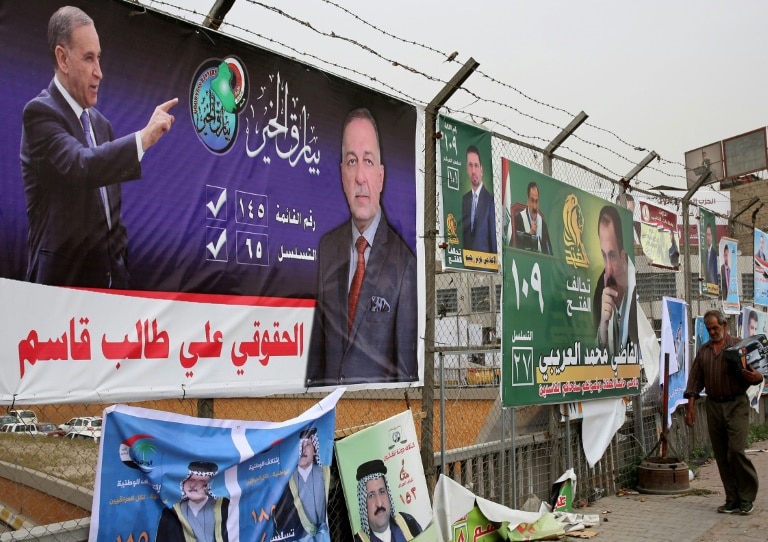Originally written for the Political Quarterly Blog:
On May 12, Iraqis vote in national elections, 15 years after the war that ended Saddam Hussein’s regime, 13 years after the first post-Saddam nationwide vote, seven years after withdrawal of US forces, and almost four years after a devastating Islamic State (IS) offensive.
Some politicians and analysts are telling us that this ballot will be a turning point, that Iraqis will finally be on the path to political and economic stability. But is this really the belated “new beginning”?
National Protests
The summer heatwave of 2015, accompanied by an abysmal supply of electricity, sparked a series of protests in southern and central Iraqi cities. The protestors were ordinary people, unaffiliated with any party, who demanded reforms in the government and an end to endemic corruption.
The protests shook the political elites and could have been a turning point in the history of Iraq, had it not been for the intervention of some powerful Islamic parties that hijacked the majority of the demonstrations.
Only a few short-term and mediocre reform measures were taken by Prime Ninister Haider al-Abadi’s government to absorb the anger of the protestors. The impeachment of some Iraqi officials by the Parliament, including Defence Minister Khalid al-Obeidi, minister of defence, a year later, was a selective measure by rival parties, rather than a real reform.
The semi-closure of the Islamic State’s file in Iraq with the announcement of the liberation of Iraqi lands did not end the problem of corruption. So far, there is no reckoning for those responsible for the fall of Mosul and other Iraqi cities. Beyond ISIS, this has become the norm in Iraq — no accountability, a lack of strong laws, or an unfair judiciary mark Iraqi institutions.
The same old faces, including those previously impeached, are frontrunners in this year’s Parliamentary election. Despite the crippled economy, the generosity of the campaigning activities — with every corner in the streets of Iraq
occupied with large billboards and posters of the candidates — has further exposed the corruption of these parties, raising questions about the legitimacy funding sources.
With the lack of transparency in the laws of the Independent High Electoral Commission — ironically formed of commissioners from the major Shia, Sunni, and Kurdish parties — candidates are enabled to conceal their finances without any penalties on the violators. A partisan commission since its establishment, IHEC often faces fraud accusations by defeated parties and by voters.
A Rigged System
The election in Iraq is, in fact, the product of a deeply-rigged system designed to reproduce the same political elites who have failed at all levels except when it comes to maintaining their power, positions, and self-interest.
Modifying the Sainte-Lague electoral method by raising its initial application of 1.0 to 1.7 has worked in favour of bigger parties. The voting system is designed to consolidate the list or the bloc rather than individual candidates. The fragmentation of traditional major parties into different blocs does not mean anything, when the majority of the candidates are the same faces re-cycled in a new list. The quota for women only adds to the problem when women are allocated seats regardless of their competence or elegibility. Iraqi people hardly know smaller parties that include independent candidates who did not previously participate in the political process.
What adds insult to injury is the post-election alliances and bargains to form the government. The legacy of the Provisional Governing Council in 2005 is a quota system in which the Prime Minister has to be Shia, the President Kurd, and the Speaker of Parliament Sunni. The choice of politicians for these posts is always subject to regional and international intervention. This quota division is mirrored in all other positions in Iraqi institutions and offices, which are widely run by patronage and nepotism.
The growing disenchantment with this unfair electoral system and with the political elites has made many Iraqis reluctant to vote in May’s election. While boycotting the election will not yield a radical change, it is an act of protest against the failure of the political process in Iraq. A low voter turnout with continuing demands to replace the electoral system can be a means to undermine the legitimacy of the election laws and the political elites.
But although the majority of ordinary people in Iraq are dissatisfied with those corrupt elites, political parties still have circles of supporters who will vote for them on religious, sectarian, ethnic, or tribal grounds.
So the election in Iraq will stand as evidence of a pseudo-democracy — for democracy cannot coexist with theocracy, tribes, and militias. It cannot exist in an environment where individual freedoms are not respected and embraced. It cannot exist when there are no strong civil society and institutions. A house is built from its foundations, not the other way round.

